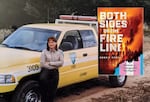For Bobbie Scopa, firefighting was a 45-year career filled with danger and stress, including a seven-year stint as assistant fire director for all wildland fire operations in Oregon for the U.S. Forest Service. But a major stressor for Scopa was living life as a man for part of that career …while privately identifying as a woman. That struggle is told in her new book, “Both Sides of the Fire Line: Memoir of a Transgender Firefighter.”
KLCC’s Brian Bull talked to Scopa, and asked her how it felt to endure stress from outside factors, as well as her inner conflict before transitioning.

Bobbie Scopa on duty with vehicle, and the cover of her new book, "Both Sides of the Fire Line: Memoir of a Transgender Firefighter."
Courtesy of Bobbie Scopa
Scopa: The Dude Fire, which is a fire that I was on, and that was where six firefighters were killed and I had been involved closely with that incident … you come back from something like that, where six people who you were just with were killed, and you just barely made it out, that is stressful. I don’t know whether it was the culture of my family, but we didn’t talk about it. No one said, “Are you OK?” Let alone this thing hanging over your head, this thing that you’ve been carrying with you since you were four or five years old, the gender … the weight of that, and then you add on the stress of people dying near you, and you almost being killed…and then throughout my career, lots of examples of — all first responders do see — tragic accidents.
That’s a tough thing to deal with, when you can’t talk about who you are. Every time you go through a critical incident, it’s like putting a big rock in your backpack. And over the course of a 40-year career, you’ve gathered up a lot of rocks. And you’re carrying lot of weight on your shoulders.
Then on top of that, you’ve got this whole gender thing you’re trying to deal with… you know, when I look back at that, it’s kinda crazy.
Bull: That title, “Both Sides of the Fire Line”…what does that refer to?
Scopa: (laughs) Well, in wildland firefighting, we build a fire line. And we use hand tools, or we use bulldozers, but we have a fire line, to put the fire out. That’s how we fight a wildland fire. And in my career, I had worked on both sides of the gender fire line so to speak, starting out my career as male. And maybe a third or halfway through my career I transitioned, and those early years of my career were very difficult. And so the title I think — a fire chief buddy of mine was the one who suggested that title. And I thought that when I heard him say it, I thought it really apropos because it tells my story. I worked both sides.
Bull: Firefighting has this very macho reputation, given it’s demanding, hands-on, and dangerous work, and is male-dominated. Did this challenge you as a transgender person?
Scopa: Well, it may sound counterintuitive, but it was more challenging before I transitioned. When I was a male working as a firefighter — and I worked also 12 years for a structural city fire department — besides the rest of my career in the wildlands — it was very male dominated and macho. And I never fit in when I was trying to — and I say when I was trying to pretend to be a male…. It was an act, and it was not easy for me. And when I came back from grad school I’d fully transitioned, and my career was so much easier after I transitioned. I was more successful.
Y’know, I had the same problems that any woman would have in those positions in leadership in the fire service. But it was much more straightforward. Because in my view of the world, my experience — firefighters can manage and deal with a strong competent fire leader who’s a woman, much more so than they can deal with a guy that they don’t think is masculine enough. So my career and my life got so much easier professionally after I transitioned.
Bull: So in the weeks since your memoir’s hit the shelves, what’s the response been?
Scopa: It’s really interesting Brian, because when I wrote the book it was painful. It was a very tough process to write. And I thought “Well, I’m going to go through all this because I want to help families.” I want a supervisor who might have a trans employee to read the book to get some understanding. And family members, the same way. And so since I wrote the book, I’ve been to lots of book readings and signings, and at every single one, someone has come up to me and said, “I read your book, oh my god, this has been such a benefit. My grandson or my granddaughter or my child, or my best friend from the army,” everybody’s got a connection. And I had no idea that there were this many people out there that had a connection to a trans child or an adult. And so since I wrote the book it’s been somewhat helpful for me to hear other people saying that the book out there and the information that’s in it is helping them.
Bull: Well, Bobbie Scopa, thank you for your time and insights. I enjoyed our conversation.
Scopa: Thanks Brian, it’s been very fun.
©2022, KLCC.